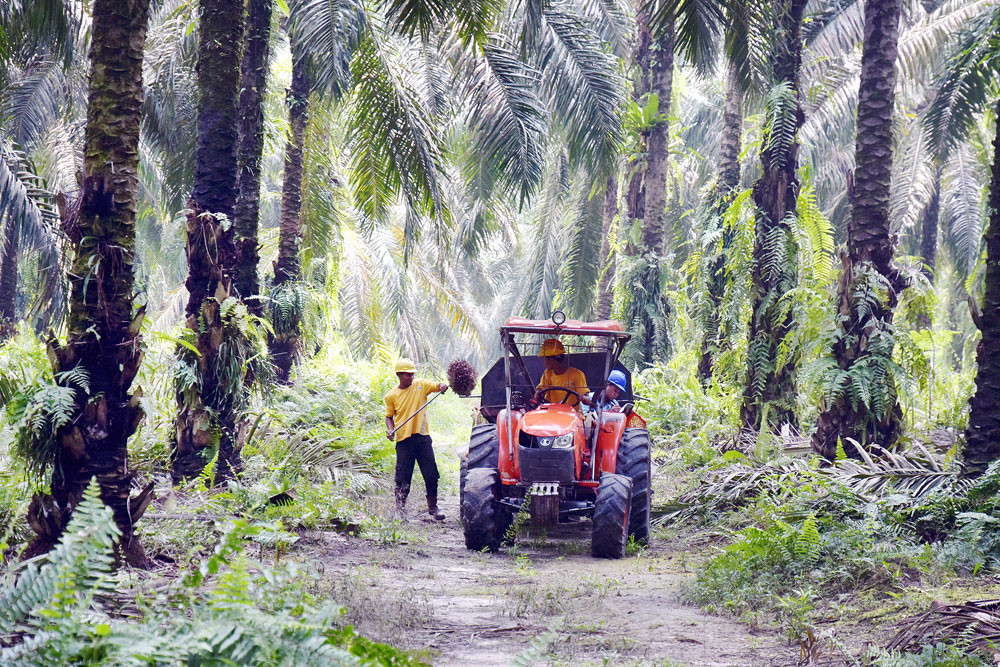Popular Reads
Top Results
Can't find what you're looking for?
View all search resultsPopular Reads
Top Results
Can't find what you're looking for?
View all search resultsSustainability issue affects fair trade in palm oil
Good palm oil standards should no longer be defined only by the sustainability principle alone but also the evidence of full compliance with fair trade principles set in a new platform involving producers, consumers and traders.
Change text size
Gift Premium Articles
to Anyone
T
he need for sustainability standards and certification has changed how palm oil companies operate. They have not, however, changed the way market and supply chains work. Their positive impact on palm oil producers has been severely limited, especially with regard to the commodity price. This has led to lopsided responsibility for the benefit of the market but in disregard to the principle of fair trade.
Despite all the good intentions of sustainability as a means to improve the industry’s performance and mitigate the negative impact on the environment and society, the only changes felt by producers are more stringent conditions on oil palm cultivation.
The roles and responsibility of consumers and traders within the issue of sustainability are like those between masters and servants, whereby the producers have to obey the demands and standards imposed by the consumers and traders. Under such circumstances, fairness and impartiality do not exist. The principle of trade has therefore been twisted and made unfair.
The multidimensional platform of sustainability has been used to control and halt palm oil development. Nonproducers (consumers and traders), notably in developed countries, led by NGOs have been campaigning against oil palm plantations, exploiting the issues of human health, the environment, wildlife conservation and social problems such as labor and land disputes.
It is unfortunate that the producers are always set to lose in the public opinion war because the producers, mostly in Indonesia and Malaysia, which together control more than 85 percent of the world’s palm oil production, do not have adequate resources to counter the anti-palm oil campaign.
Good palm oil standards should no longer be defined only by the sustainability principle.
The international negative campaign has been so successful, though not all the allegations against the commodity have been proven, that the growth of the palm oil market share in European Union has been stagnant and the price has been declining.
In March, the EU restricted the volume of biofuels made of palm oil that may be counted toward the bloc’s renewable-energy goals. By 2020, member states must ensure at least one-tenth of their fuel consumption comes from renewable fuels, but palm oil-based products will not count. By 2030, the EU aims to stop all imports of palm oil.
Then, on Aug. 14, the EU escalated the anti-palm oil campaign when the group reintroduced tariffs, ranging from 8 to 18 percent, on subsidized palm oil imports from Indonesia, following a probe which, the group said, found subsidies given to domestic producers.
The palm oil industry has been haunted by health concerns promoted by NGOs without strong scientific evidence.
Although abundant studies have concluded that palm oil is on a par with other vegetable oils, the negative perception that palm oil is bad for human health has lingered.
The allegations of palm oil as the main cause of massive deforestation and environmental damage, such as forest fires and haze continue even though growers and the government in Indonesia have made significant improvements and have stepped up the introduction of high sustainability standards under their own certification system, known as Indonesian Sustainable Palm Oil (ISPO). In fact, forest fires in the United States, Australia and Brazil have often been bigger than in Indonesia.
The drivers of the anti-palm oil campaign in developed countries often simply ignore the complexity of the palm oil sector. They do not appreciate that the problems within the oil palm estates are related to poverty as 40 percent of the plantations are owned by smallholder farmers with less than 2 hectares of land.
No wonder that many in Indonesia and Malaysia have seen the anti-palm oil campaign as an instrument of capitalism to protect vegetable oil (soybean, rape seed, etc) producers in developed countries who are never able to compete with palm oil as its yield is more than nine times those of other vegetable oils.
The challenge and next agenda now is how to restore fair trade principles for palm oil without neglecting the need for sustainability, which in turn requires a set of highly economic, social and environmental standards.
But the standards should be set together by developed and developing countries in a forum whereby both are equal partners.
Good palm oil standards should no longer be defined only by the sustainability principle alone but also the evidence of full compliance with fair trade principles set in a new platform involving producers, consumers and traders.
Both producers and nonproducers (consumers and traders) along with their value chains must get together to develop new good palm oil standards of sustainability and fair trade through a multistakeholder platform.
The principle of sustainability alone is not adequate to ensure prudent production and use of palm oil. It has to be augmented by the inherent principle of fair trade.
All of us need to rebalance the equation from lopsided sustainability-market driven to all-inclusive shared responsibility.
***
Oil palm plantation senior executive. The views expressed are his own.










